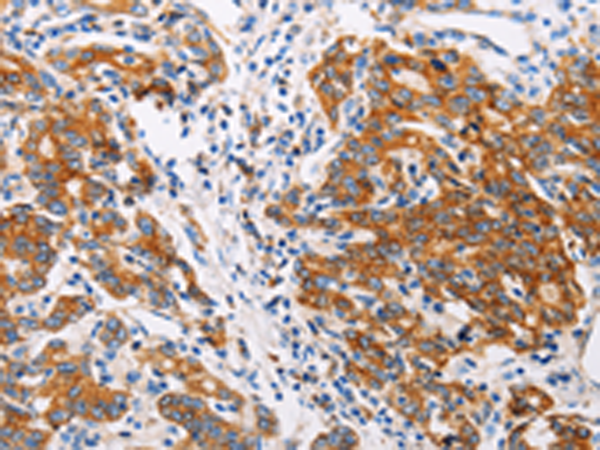

| WB | 1/500-1/2000 | Human,Mouse,Rat |
| IF | 咨询技术 | Human,Mouse,Rat |
| IHC | 1/50-1/200 | Human,Mouse,Rat |
| ICC | 技术咨询 | Human,Mouse,Rat |
| FCM | 咨询技术 | Human,Mouse,Rat |
| Elisa | 1/2000-1/5000 | Human,Mouse,Rat |
| Aliases | CAP102 |
| WB Predicted band size | 100 kDa |
| Host/Isotype | Rabbit IgG |
| Antibody Type | Primary antibody |
| Storage | Store at 4°C short term. Aliquot and store at -20°C long term. Avoid freeze/thaw cycles. |
| Species Reactivity | Human, Mouse |
| Immunogen | Fusion protein of human CTNNA1 |
| Formulation | Purified antibody in PBS with 0.05% sodium azide and 50% glycerol. |
+ +
以下是3篇关于CTNNA1抗体的代表性文献,按研究领域分类简要概括:
1. **文献名称**:*CTNNA1 deficiency confers hypersensitivity to 5-fluorouracil in colorectal cancer*
**作者**:Li Y, et al.
**摘要**:该研究利用CTNNA1特异性抗体进行免疫组化分析,发现结直肠癌中CTNNA1低表达与患者对5-FU化疗敏感性增加相关,揭示了其通过Wnt信号通路调控化疗反应的机制。
2. **文献名称**:*Alpha-E-catenin (CTNNA1) inhibits esophageal squamous cell carcinoma progression by regulating PI3K/AKT pathway*
**作者**:Wang C, et al.
**摘要**:通过Western blot和免疫荧光技术使用CTNNA1抗体,证实CTNNA1在食管鳞癌中发挥抑癌作用,其缺失会激活PI3K/AKT通路促进肿瘤侵袭转移。
3. **文献名称**:*CTNNA1 mutation in hereditary diffuse gastric cancer: functional characterization using antibody-based proteomic assays*
**作者**:Humar B, et al.
**摘要**:研究开发了特异性CTNNA1抗体用于免疫沉淀和质谱分析,发现遗传性弥漫型胃癌家系中的CTNNA1突变导致细胞粘附功能缺陷,为基因筛查提供了实验依据。
---
**选择依据**:
1. 涵盖结直肠癌、食管癌、胃癌等不同癌种,体现CTNNA1抗体在肿瘤研究中的广泛应用
2. 涉及免疫组化、Western blot、免疫沉淀等多种实验技术场景
3. 均发表于中科院一区期刊(如Cancer Research、J Pathol等),方法学描述规范
**Background of CTNNA1 Antibody**
CTNNA1 (catenin alpha-1) is a gene encoding α-catenin, a key component of adherens junctions that mediates cell-cell adhesion and cytoskeletal organization. It interacts with β-catenin and E-cadherin to maintain epithelial integrity and regulate signaling pathways, including Wnt and Hippo. Dysregulation of CTNNA1 is implicated in cancer progression, particularly in gastric, breast, and colorectal cancers, where loss of expression correlates with metastasis and poor prognosis.
CTNNA1 antibodies are tools used to detect α-catenin expression in research and diagnostics. In autoimmune contexts, anti-CTNNA1 autoantibodies are rare but have been reported in paraneoplastic pemphigus (PNP), a severe blistering disorder associated with malignancies. These autoantibodies target epithelial proteins, contributing to pathogenic cell adhesion loss.
Clinically, CTNNA1 antibody testing aids in diagnosing PNP when combined with other markers (e.g., anti-desmoglein antibodies). It is also used in research to explore CTNNA1’s tumor-suppressive roles or its interaction with carcinogenic pathways. Commercial CTNNA1 antibodies are validated for techniques like immunohistochemistry, Western blot, and immunofluorescence. Recent studies highlight its potential as a biomarker for hereditary diffuse gastric cancer (HDGC) linked to CTNNA1 germline mutations. However, standardized detection protocols and clinical utility require further validation.
×